Editor’s note: The following comprises the fourth chapter of Seven Roman Statesmen of the Later Republic, by Sir Charles Oman (published 1902).
IV. From the Gracchi to Sulla
Caius Gracchus was a striking example of the truth of the melancholy adage that
“The evil that men do lives after them,
The good is oft interred with their bones.”
For among all the many measures that he brought before the Roman people, precisely those which were evil in their tendencies survived him, while those wherein lay the seeds of good were thrust aside and ignored for another generation. The corn-dole which he had invented proved so popular that the victorious Optimates dared not meddle with it. It remained as a permanent curse, pauperising and demoralising the city multitude, and ruining what was left of Italian agriculture. The new equestrian jury-courts sold justice so shamelessly, for the next thirty years, that men began at last to talk of the period when the senators had been judges as the good old times. The Asiatic tithe-farming went on, and gradually ruined that fine province, besides provoking therein such a virulent hatred of Rome, that (as we have already pointed out) when the Asiatics got their first chance of revolt, in the days of King Mithridates, they rose like one man and massacred 80,000 Roman citizens in a single day.
But the two really valuable remedies for the ills of the state which Gracchus had advocated were thrust aside, if not forgotten. Transmarine colonisation was stopped, and the new settlement at Carthage was destroyed. The Italians were commanded to give up all idea of obtaining the franchise; indeed, special care was taken to close the various avenues by which individuals had hitherto found it possible to slip into the citizen body.
As to the Agrarian Law, which Tiberius had framed and Caius had re-enacted, the Senate did not formally repeal it, nor did they give back the confiscated land to the possessores. They simply removed, one by one, the Gracchan checks on the economic tendency of the times, and allowed the new farmers to die out by slow extinction. Livius Drusus, it will be remembered, had made the Gracchan allotments alienable, and abolished the ground-rent due from them, even before Caius fell. In B.C. 119 a law was passed which dissolved the Land Commission, so that no further distribution could be made; it also provided that such domain land as still remained in the hands of the original possessores should be secured to them on condition of their paying a small rent, which was to be employed in subsidising the ever-growing needs of the corn-dole. Lastly, in B.C. 111, a third law was passed, which removed this rent and made the land into the freehold private property of the occupiers. The moment that they got the opportunity of alienating their farms, under the law of Drusus, the Gracchan holders began to dispose of them. Agriculture did not, and could not, pay; political economy exerted its iron law, and the allotments were sold, for what they would fetch, to the nearest capitalist. The latifundia once more commenced to grow up, and the decrease in the number of small landowners is marked from B.C. 118 onward by the regular shrinkage of the census-returns. By the end of the century it is probable that the whole effect of the Gracchan redistribution of land had passed away. Only a few years later it was said, doubtless with gross exaggeration, that the larger part of the land of Roman Italy was in the hands of no more than 2000 proprietors.
Meanwhile it must be remembered that the Senate never thoroughly recovered that undisputed control of all the machinery of the state which it had possessed in the old days before the appearance of the Gracchi. It never dared to strike at the Equestrian Order, which remained as a permanent check on its omnipotence. Even when the abuse of the law-courts by the knights had grown into a perfect scandal, the Senate refused to commit itself to an attack upon such a powerful body of enemies. Apparently the leading Optimates lived in a state of constant apprehension that a new Gracchus might at any moment arise to dispute their authority, and wished to do no more than to avoid friction and hang on to the emoluments of power. They managed, by a policy of short-sighted opportunism, to maintain their ascendency from year to year, till at last, after a considerable interval, the Democratic party again found leaders and a programme, and civic strife recommenced.
From the death of Caius Gracchus in B.C. 121, down to the appearance of Marius on the political stage in B.C. 106, the Democratic programme lay dormant. The history of the time turns mainly on questions of foreign policy, and it was by their incompetent management of those questions that the Optimates finally gave their adversaries a chance of raising their heads. It was not an age of peace: all through these years the people were muttering and murmuring; occasionally there were riots, or an unpopular magistrate was impeached, or a law backed by the Senate was rejected in the Comitia. But there was no continuous agitation for any definite political end, nor did any leader succeed in rallying the Democratic faction for a new attack on the Senate. As the constitution then stood, a single omnipotent leader, provided with the tribunate or some other important magistracy, was needed to galvanise the sovereign people into activity. It could only put forth its strength if guided by an autocratic chief, using the “one-man power” which a democracy really loves. And the chief was long in coming.
Meanwhile the main thread of the annals of Rome consists of the history of two long foreign wars, both grossly mismanaged by the Senate at home and by the incapable oligarchs who were sent out to bear rule in the provinces. These were the lingering Jugurthine troubles [B.C. 117-105] and the dangerous Cimbrian war [B.C. 113-101]. It is unfortunate that while we possess an elaborate (if not altogether trustworthy) narrative of the African affair in Sallust’s Jugurtha, the story of the far more important Cimbrian campaigns has to be gathered from imperfect notes in Plutarch, Appian, and the Epitome of Livy.
It was in consequence of the Jugurthine war that the Democrats first began to raise their heads again. The facts of the Senate’s maladministration were sufficiently disgraceful. The king of a not very powerful subject state had broken all his treaties, slain off the cousins whom the Senate had made his colleagues, and done whatever he pleased in Africa, without paying the least attention to the commands of the suzerain power. When embassies of remonstrance were sent him, he had merely quieted the envoys by judicious bribes combined with lavish promises of submission. He carried on this shameless policy for five years (B.C. 117-112), and might have persisted even longer in it, if he had not let the savage break out in him at an inauspicious moment. When he crushed his last surviving cousin by the capture of Cirta in B.C. 112, he massacred not only the Numidian garrison, but a great number of Roman and Italian residents in the place. This atrocity so much aroused the anger of the Roman people that the Senate was forced to declare war on Jugurtha. It was abominably mismanaged; of the two imbecile generals to whom the subjection of Numidia was first entrusted, one granted the king terms of peace which the indignant people refused to ratify. The second so misconducted himself that his army was scattered, beaten, and sent under the yoke.
These disasters roused a tempest of wrath at Rome; public opinion was so strongly excited that under a temporary leader — one Mamilius Limetanus — the people created a Court of High Commission, which raged against the prominent members of the Optimate ring, sent into exile the two incapable generals Bestia and Albinus, and revenged an old grudge by packing off after them Opimius, the consul who in B.C. 121 had put down Gracchus and his friends with such cruel zeal. But in spite of this outburst the Senate was not yet deprived of the control of foreign affairs, and was allowed to send forth against Jugurtha its best fighting man, Q. Caecilius Metellus [B.C. 109].
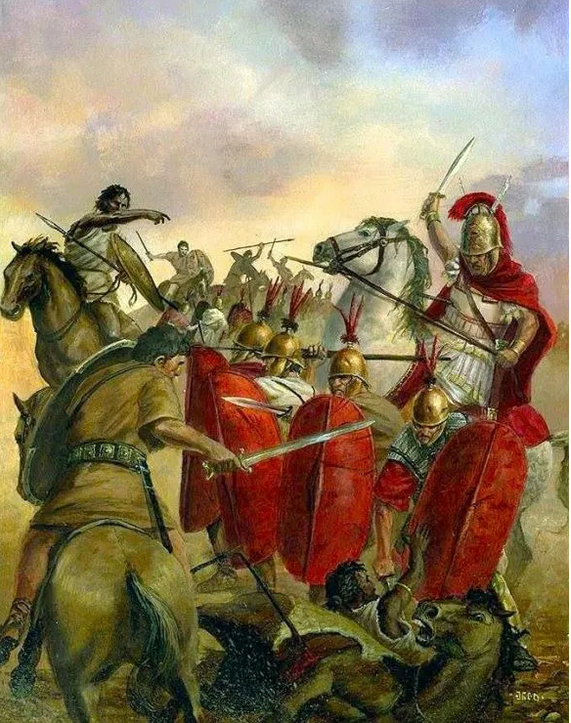
The new general was fairly successful, but he did not work quickly enough to please the angry critics of the forum. He took most of Jugurtha’s fortresses, but the king fled into the Atlas and the Sahara, and maintained a desperate guerilla warfare which seemed likely to linger on for ever. The people were, perhaps unjustly, dissatisfied; they did not understand (as we understand only too well in this year of grace 1902) the difficulties of hunting down elusive bands of marauding light horse.
It was at this moment that there at last appeared a serious candidate for the headship of the Democratic party. Caius Marius was a man of a very different type from his predecessors in that post; he was a rude soldier who had risen from the ranks by his hard head and undaunted courage. He had none of the literary polish, the philosophic training, or the lofty eloquence of the two Gracchi. As a politician he can only be described as a blatant demagogue; he had not the brains or the imagination to sketch out a political programme. He was no more than a discontented and ambitious veteran, with a personal grievance. His simple method of achieving notoriety was to declaim to the multitude concerning the very real abuses of the senatorial government, and to promise to set all to rights if he were made consul. He most unjustly blamed Metellus for the protraction of the war, and promised to end everything in a year if only he were placed in office. He had been provoked by the aristocratic hauteur and quiet insolence of the proconsul, and was thinking quite as much of revenging personal slights to himself as of giving the Democratic party an opportunity of seizing the reins of power.
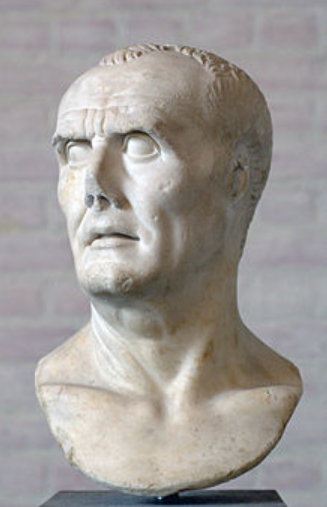
The vulgar self-assertion and coarse invective of Marius did not disgust the multitude; he was duly elected, and straightway went over to Africa to supersede Metellus. The province was not assigned to him by the Senate. In spite of their opposition he had a bill passed in the Assembly, which gave him charge of the Numidian war. But though he took large reinforcements with him, legions raised on a new system, by volunteers from the lower orders of the city, he was not at first much more successful than his predecessor. He scoured the whole country-side with movable columns, but he could not catch the evasive Jugurtha. His reputation might have been wrecked if chance had not come in to his aid. His quaestor, L. Cornelius Sulla, at last succeeded in capturing the Numidian king, not by force of arms, but by treachery. He bribed Jugurtha’s Moorish allies to seize and surrender their guest; the king was kidnapped and made over to Marius, and then the war came suddenly to an end [B.C. 105].
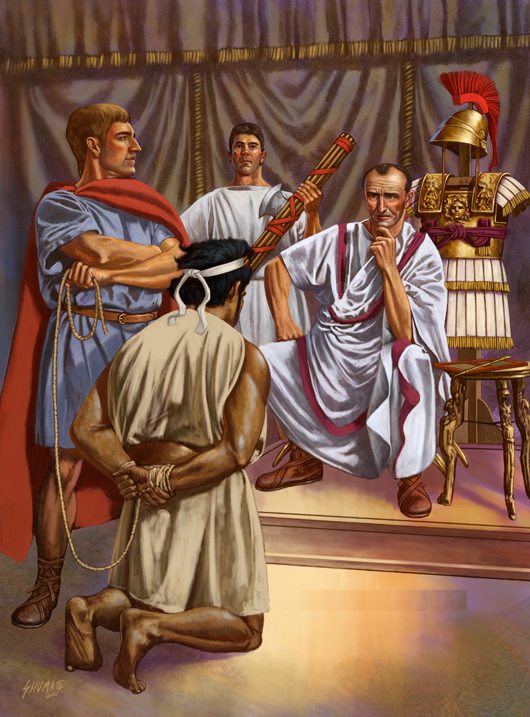
Marius had redeemed his promise to put an end to the Numidian struggle, though the method in which it closed was neither glorious nor dignified. But he had saved his reputation, and was able to celebrate a triumph, and to pose before his supporters as a successful general. At the moment of his return he had the state at his mercy, for the Senate was cowed, and the people would have been ready to grant him anything he asked. Moreover, he had legions at his back; the democracy for the first time was armed with sword and shield, and did not depend on the stones and staves of riotous mobs.
If external troubles had not intervened there must have been a political explosion of some sort in B.C. 105-104; it might very possibly have ended in the installation of Marius as temporary ruler of Rome. But neither he nor the Senate had the leisure to turn their attention to domestic politics. For the first time since the fall of Hannibal a serious danger from without was impending over Italy. The year B.C. 105 witnessed the most dreadful disaster to the Roman arms, with the possible exception of Cannae, that ever occurred in the days of the Republic. For the last eight years there had been unrest along the northern frontier of the empire, both in the Balkan Peninsula and in the Alpine lands. All the unknown barbarism of Central Europe was on the move; tribe was thrusting against tribe, and the outer waves of the seething whirlpool of nations were washing against the borders of the provinces of Macedonia and Narbonese Gaul. At first the troubles were not serious; the attention of Rome was distracted to the Jugurthine war, and little attention was paid to the raids of the Celts or Germans. But things gradually grew worse: several small Roman armies were cut to pieces: there were mishaps of some importance in 113, 109, and 107. At last the situation grew so threatening that the Senate despatched two large armies — a dozen legions of raw recruits — to defend the frontiers of Gaul. For the originators of all the stress and turmoil, the great mass of migratory bands whom we vaguely know under the name of the Cimbri and Teutons, had thrust aside the lesser tribes and were marching against Italy itself.
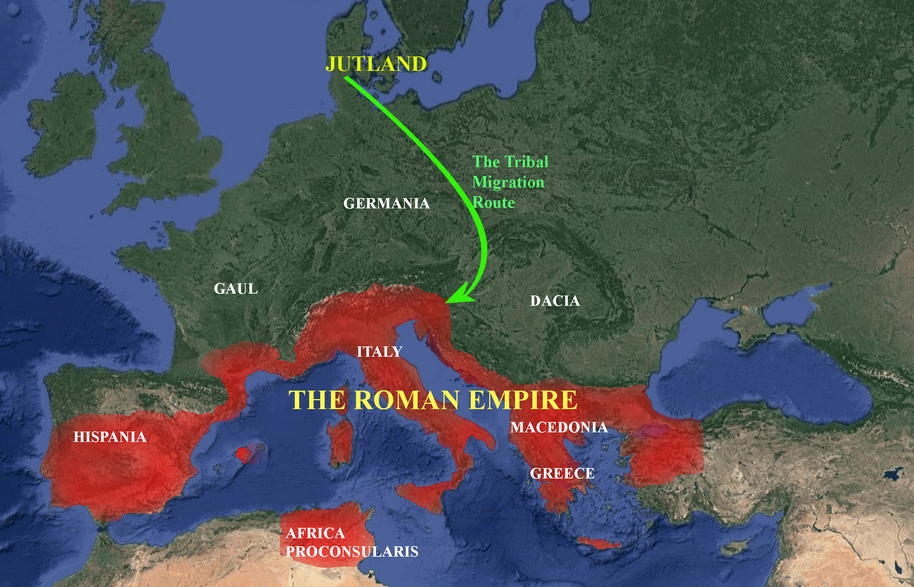
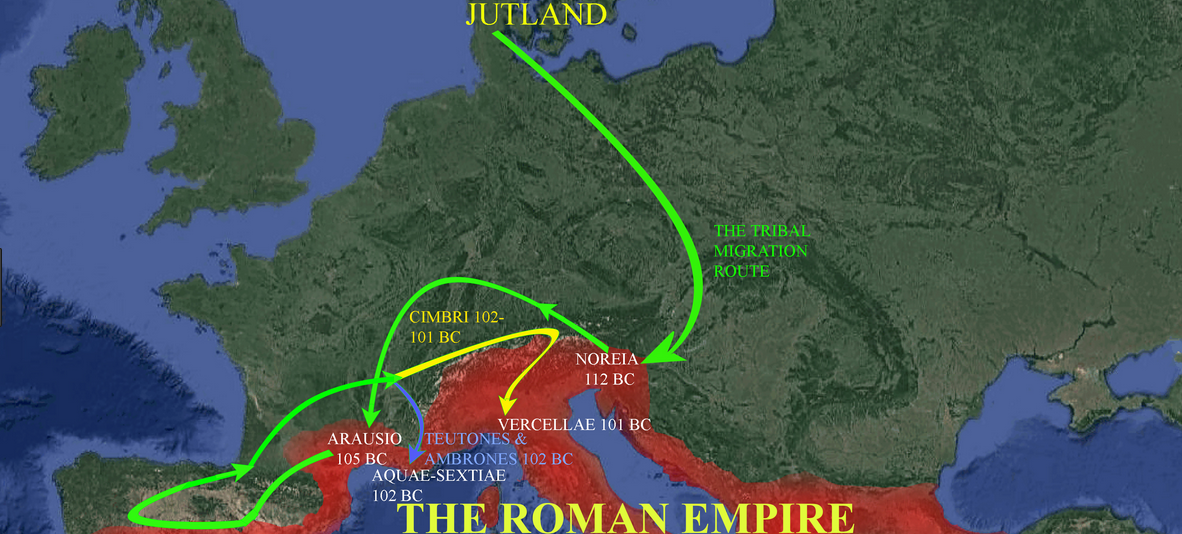
An awful disaster ensued: the two incapable and quarrelsome generals, Mallius and Caepio, found the invaders on the Lower Rhone, and attacked them with foolhardy confidence. They did not even combine their forces, though their camps were less than a day’s march apart. Caepio, in disobedience to the orders of his superior, attacked the enemy’s camp in the morning: he was defeated and his legions annihilated. In the afternoon the Germans threw themselves upon Mallius, slew him, and cut to pieces the whole of the second Roman army. Eighty thousand men fell in the two battles of Arausio [Oct. 6, 105]: not a cohort remained to guard the passes of the Alps: the only hope of Rome was in the army which Marius was bringing home from Africa. If the barbarians had marched at once for Turin or Genoa, it is hard to say what they might not have accomplished. But they lingered long in the valley of the Rhone, and then, to the surprise of all men, drifted away towards the Pyrenees instead of crossing the Alps.
Thus Rome was given the chance of re-organising the defence of her frontiers, and Marius, instead of practising demagogy in the Forum, hurried northward with his troops, to interpose between the barbarians and the gates of Italy. The Cimbrian war, contrary to all expectation, was protracted for five summers (B.C. 105-101), and Marius, re-elected year after year to the consulship, was kept perpetually in the field, watching for the moment when the enemy should at last make up their minds to deliver their great stroke. It was not till they had wandered far and wide in Spain and Gaul, spreading devastation around them, that the barbarians turned back at last to the true objective, and marched in two vast columns against Italy, the Teutons by the nearer route through Provence, the Cimbri by the longer sweep that leads through Southern Germany, by the Brenner Pass and the line of the Adige, down to Verona.
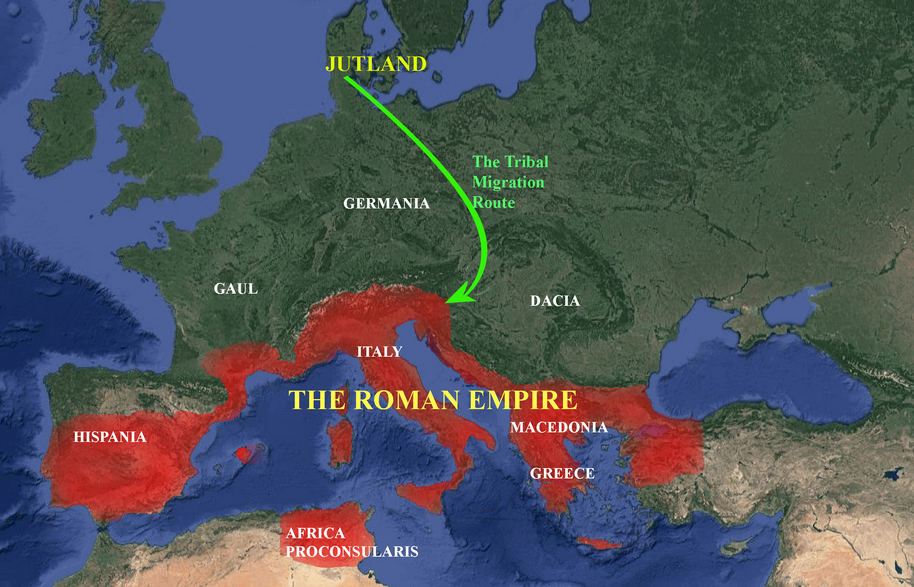
Marius now showed that at least his reputation as a soldier had not been exaggerated. We must not linger over the details of his two great victories. In 102 he warred down the Teutons in a long running fight among the hills of Provence, which ended with their complete destruction at the battle of Aquae Sextiae. In the following spring he crossed the Alps into Italy to meet the Cimbri, who had at last completed their long circular march, and had descended into the plains of the Po. At Vercellae he annihilated them, with a slaughter as great as that of his Teutonic victory in the preceding year. The disaster of Mallius and Caepio was revenged, and Rome was safe from the Northern invader for another five hundred years.
The man who had put an end to the long nightmare of fear which had hung over the city from the day of Arausio to that of Vercellae, might have asked and obtained from the people any reward that he might choose. They offered libations to him, as if he were a god, and hailed him as “the third founder of Rome:” he might have been her eighth king had he known the right way in which to sue for the sceptre and the diadem. But the great general was the most bungling and incompetent of politicians. His naive vanity and clumsy ostentation made him ere long ridiculous — a grave fault in a pretender to supreme power. The Optimates sneered at his solecisms in grammar and in dress: these might have been imperceptible to the multitude, but even they were forced to laugh at a consul who was always trying to make great political harangues and breaking down hopelessly in the middle. “The firmness which he displayed in battle did not accompany him into the assembly, and the least interruption or distraction disconcerted him, so that he promptly became incoherent.” Moreover, even the rabble would have preferred a leader who did not mix vulgar familiarity and vainglorious ostentation in such a curious measure, and who could have concealed more successfully his growing addiction to the wine-cup.
But, in spite of all his obvious defects, Marius was firmly convinced that he was to be not only the preserver of Rome from the barbarians, but also the destined “saviour of society,” who was to take up the task of the Gracchi and to tear the administration of the empire from the incapable hands of the Senate. A little experience convinced him that he was not really suited for the work of a mob orator, nor for the drawing up of an elaborate political programme of reforms. But the only result of this discovery was to make him resolve to take into his pay useful persons capable of writing his speeches and drafting his bills for him. He must find tools and mouthpieces who would act as his agents in the work of revolution.
Unskilful in every political action, Marius enlisted as his managing partners two able and reckless scoundrels, whose disreputability was to be the ruin both of himself and of the Democratic cause. These two choice spirits, L. Appuleius Saturninus and C. Servilius Glaucia, were the Roman counterparts of the Cleophons and Hyperboli of Athens. The former was a contentious, obstinate man, who (as quaestor in 104) had a quarrel with the Senate, in which he considered that he was ill-treated. Since then he had devoted himself to the career of malcontent and exposer of abuses. In B.C. 103 he had obtained the tribunate, and had used its powers by bringing perpetual charges of bribery or misconduct against unpopular Optimates, by raising mobs, and by sweeping the streets whenever the spirit seized him. He was now anxious to take another turn of tribunicial power. His colleague, Glaucia, seems to have been a shade less violent, but even more insolent and disreputable. His special talent lay in the direction of vulgar and indecent stump oratory, with which he could always keep the multitude on the roar.
Having enlisted the support of this precious pair, Marius started on his career as a Democratic reformer. He allowed Saturninus to draw up the programme for him; he for his part was to support it with the majesty of his military reputation, and, if necessary, by calling in the aid of his disbanded veterans, who were loafing about the city by thousands, living on the great donatives which they had received at the end of the Cimbric war. The “platform” of the revived Democratic party consisted of a reproduction, with some slight variations, of the schemes of Caius Gracchus. The permanent support of the urban mob was to be bought by a grotesque exaggeration of that statesman’s detestable corn-law. The dole had been issued to the citizens since B.C. 1 22 at the rate of 6 1/2 asses per modius. Saturninus proposed to sell the corn for the ridiculous price of five-sixths of an as; he might as well have given it away for nothing. Less objectionable by far was the revival of Gracchus’s great scheme for transmarine colonisation. Saturninus had already proposed to revive the Gracchan scheme of colonising Africa, for the benefit of the veterans of the Jugurthine war. Now he produced a grandiose plan for transmarine colonisation on the largest scale. It included a law for the planting of colonies in Achaia, Macedonia, and Sicily, and another for the distribution of great regions both in Gaul and in Africa among the victorious soldiery of the Cimbric war. Marius was to be entrusted with the execution of the whole vast scheme. The Italians were also to be pacified by this measure, for they were to be included in the Gallic distribution, and each settler was to receive full burgess rights. Saturninus had grasped the fact that the city rabble, on whose votes he had to subsist, objected to the enfranchised Italians at home, who might cram the Forum and scramble for doles, but had no objection to the enfranchised Italian who had been packed off to Africa or Central Gaul. Out of sight would be out of mind. His colonisation scheme, therefore, was contrived to play a double part, in satisfying the veterans and in pacifying the allies. In strict accordance with Gracchan precedents, bills were added to strengthen the already over-great power of the Equites in the law-courts. But there was a most original novelty included in the Appuleian Law: the reckless tribune subjoined to it a clause compelling every senator to swear obedience to the whole code within five days of its passing the Comitia, on pain of losing his seat. For intolerant suppression of adverse opinion no more stringent device had ever been invented. The Senate as a power in the state would have been annihilated, if it had been forced to submit to such ordinances.
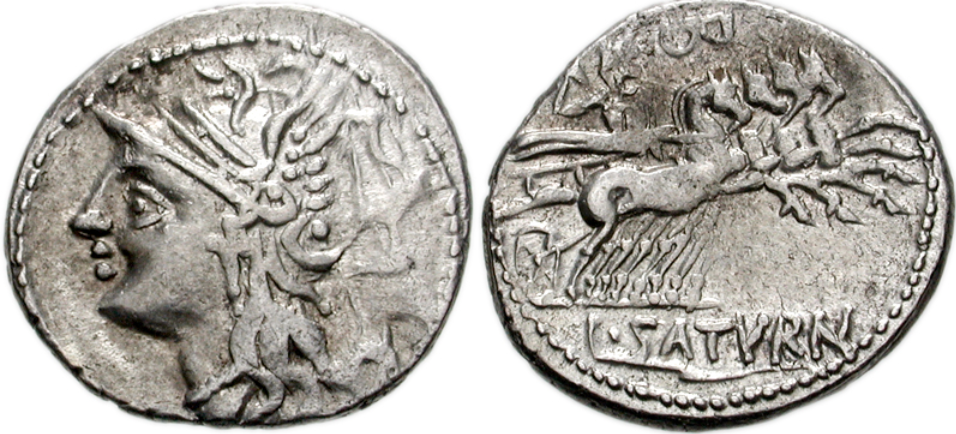
But it was not so much the contents of the Appuleian Laws which proved fatal to their framer and his patron, as the way in which the laws were carried. Saturninus’s whole career was a carnival of violence and outrage. He habitually went about attended by turbulent mobs, who beat or slew anyone who dared to differ from their idol. His followers were capable of anything: in the tribunicial elections for B.C. 100 it seemed probable that he would fail to be chosen. Thereupon a band of his satellites fell upon and stoned to death Q. Nonius, one of the successful candidates. Saturninus was elected to fill the vacant place. It was just possible to look upon this sinister coincidence as the work of chance; but no one could mistake its meaning when precisely the same thing happened at the consular elections for the succeeding year. Glaucia was a candidate under the protection of Saturninus and Marius. It seemed likely that he might be beaten by Caius Memmius, a man who, though now a moderate member of the Optimate party, had been a very popular Tribune of the Plebs eleven years before, and had headed the agitation against the mismanagement of the Jugurthine war. The moment that his candidature was seen to be dangerous, Memmius was set upon by a gang of ruffians and beaten to death.
These were perhaps the most shocking of the deeds of Marius’s enterprising lieutenant, but his general behaviour was quite in keeping with them. When the law dealing with the corn-dole and the Gallic colonies was before the Comitia, some Optimate tribunes tried to interpose their veto. Saturninus did not take the trouble to deal with them as Tiberius Gracchus had dealt with Octavius; he simply had them thrown off the rostra and went on with the proceedings. The evicted magistrates, though much knocked about, struggled to the front and began crying that “they heard thunder on the left,” which should have brought the meeting to an end. But Saturninus, pointing with a menacing gesture to the stones which his followers were gathering up, told them that they had better beware, or it would not only rain but hail The tribunes discreetly fled; but a hot-headed young Optimate, the quaestor Q. Caepio, collected a band of his clients and supporters, girt up his toga and stormed the rostra, upsetting Saturninus and those about him. The assailants were but a handful, and the demagogue, rallying his forces and putting Marian veterans in his front rank, charged back, drove off Caepio and his gang, and completed the formalities of passing the bill among desperate noise, confusion, and tumult.
It was farcical to call such a mere riot a legal meeting of the Comitia, or to hold that bills which had been vetoed by half-a-dozen tribunes had any binding force. But it was for refusing to swear obedience to them that Quintus Metellus, the haughty but honest and capable predecessor of Marius in Numidia, was driven into exile.
There seemed to be no length to which Saturninus and Glaucia would not go. But their triumphant violence defeated their own ends: Marius was prepared to wink at a good deal of ruffianism on the part of his supporters, but he drew the line at the systematic murder of respectable opponents, and would have preferred to see the opposite party in the assembly overawed by threats rather than driven out with sticks and stones. Clearly he began to fear his own lieutenants, and to doubt whether they might not turn against him instead of merely carrying out his plans. He suddenly dropped his support of them, secretly informed the Optimates that he would not be responsible for their acts, and passed the word round among his veterans that they were to remain neutral.
Exasperated at being disavowed by their employer, Saturninus and Glaucia tried to continue their wild career on their own behalf, and in December B.C. 100 brought matters to a head by seizing the Capitol with the object of carrying through a regular coup d’état. What exactly they intended to accomplish we cannot guess; certainly it can hardly have been (as their enemies asserted) to proclaim Saturninus king, or even dictator. But deprived of the aid of the veterans of Marius, they proved no more able to defend themselves than Caius Gracchus and Fulvius had been in B.C. 121. The Optimates easily shut them in and held them beleaguered, while the Senate proclaimed martial law. Marius, much against his will, was forced to lend his sanction as consul to their proceedings. When the besiegers had succeeded in cutting off the supply of water from the Capitol, Saturninus and his crew were forced to surrender. They were placed under a guard in the Senate-house by the orders of Marius; but the Optimate mob tore off the roof, and pelted the prisoners to death with tiles before the consul could interfere.
Thus ended the third attempt of the Democratic party to seize the conduct of affairs, and to make an end of the Senate as a governing body. It failed mainly from the incapacity of Marius either to conduct a political campaign himself, or to select agents who would be competent to do so in his behalf. If he had known how to secure men of tact and discretion instead of reckless incendiaries, he might have done what he pleased: for the strength of his reputation would have carried everything before it in B.C. 101, and the arms of his veterans were at his disposal. But Saturninus, in spite of a certain ability and energy, was frankly impossible either as leader or lieutenant. He would have wrecked any cause by his insolence and recklessness.
Marius, much disappointed by the failure of his schemes, and more or less conscious of the ridiculous figure which he had cut, retired from Rome when his consulship was over, and went for a long tour in Asia, under the pretext of fulfilling a vow which he had made during the Cimbrian war to the gods of the East. When he returned, he found that he had been half-forgotten, and that the Senate was more powerful than it had been at any time since the fall of the Gracchi. There was a gap of more than eight years before any serious political strife again arose at Rome; but the unsatisfactory economic and constitutional position of the Republic once more produced its inevitable result, and a new reformer arose.
Marcus Livius Drusus differed from his predecessors in that he was in no sense a legitimate descendant of the Gracchi. He was what in modern phraseology we should call a “Tory-Democrat.” He believed that the Senate was far more fitted than the assembly to administer the empire. He had taken part against Saturninus in B.C. 100, and his views, as to what were the main dangers of the state and how these dangers should be met, differed from those which were held by the Democratic party. In personal character he was as unlike Saturninus and Glaucia as can well be imagined, being a man of very staid and even haughty carriage, extremely strict in his morals, and self- conscious beyond the limit of priggishness. He was so well aware of his own virtues that his dying words are recorded to have been that “he wondered how many years would elapse before the state would get another citizen as good as himself.”
After having studied for several years the unsatisfactory condition of the Republic, Drusus had come to the conclusion that its main dangers were the ever-growing power and insolence of the Equestrian Order, the corporation of financiers to whom Caius Gracchus had sacrificed the state, and the discontent of the Italian allies. He also thought that something might still be done to re establish the yeoman class by providing new colonies at Capua (an old idea of C. Gracchus) and in Sicily. There was nothing in these views which might not be held by a sincere Optimate, and Drusus found that he might look for support from all the more enlightened members of the Senate. For the first time a reformer was backed by a large proportion of the most important men in the state. The better sort of senators had long been chafing at the corruption of the equestrian law-courts, and of late the condemnation of the virtuous Rutilius Rufus for his blameless government in Asia had provoked them beyond endurance. As to the question of giving the franchise to the allies, any sensible Optimate could see that the existing constituency in the Comitia was as bad from his point of view as any other body that could be created. It could do no harm if the urban multitude were diluted, or even swamped, by the sturdy farmers of those parts of Central Italy to which agricultural depression had not yet penetrated. The Agrarian Law, too, which Drusus proposed had not the confiscatory character of that of Tiberius Gracchus. The Campanian state-domains and the other small remnants of public land in Italy were being held on lease; they had not practically passed into private possession, as had the estates which had been resumed by the Gracchan law of B.C. 133; and to colonies in Sicily no one could have any rational objection. The fertile island had been so wasted by the slave war of B.C. 104-101 that it could afford to take in a very large body of new settlers.
It is impossible to deny that the reforms of Drusus were less objectionable, and had a more respectable and influential set of supporters, than any other of the programmes which were laid before the Roman people during the last century of the Republic. Unfortunately their author did not introduce them in the best or wisest fashion. The bills had to pass the Comitia, and that corrupt constituency had to be conciliated. Thinking that the Agrarian Law would not suffice to buy it over, Drusus linked to his other proposals one of a most openly immoral sort. He offered to increase the pernicious corn-dole, by adding to the amount of state grain which each citizen was allowed to purchase every month. It was represented to him that the treasury could not stand the expense, wherefore he enacted that the coinage should be debased in order to find the extra money. Of every eight denarii issued by the mint, one was to be of copper plated with silver, and to refuse the base coin was to be a high offence. Evidently Drusus was no economist; but even though the ancient world had not discovered “Gresham’s Law,” that the bad money drives out the good, he must have known that his bill would cause grave financial troubles. It was clearly a case of doing evil that good might come.
Drusus found himself at the head of a very heterogeneous body of partisans. His proposals had caused a cleavage in both of the old factions. He was backed by the better half of the Senate, by the Italians, and at first by that blind and greedy majority in the assembly which would vote anything that was sweetened by a corn-dole. Against him were the Equites and that section of the Senate which was simply reactionary, and opposed to all manner of change merely because it was change. He had also to reckon with that part of the urban multitude which regarded the extension of the franchise to the Italians with such distaste that they feared and shunned any one who might propose it.
Quite conscious of the existence of this latter body, Drusus (with more wiliness than honesty) brought forward together his laws for depriving the Equites of the control of the courts, for planting the colonies in Italy and Sicily, and for increasing the corn-dole. To do so directly contravened the Lex Caecilia Didia passed in B.C. 98, which forbade the introduction of clauses dealing with several distinct subjects under a single preamble. Nevertheless the proposals were carried, in face of a bitter opposition, headed by the consul Marcius Philippus. The meeting at which they passed was much disturbed, and the adversaries were so vehement that at last Drusus had Philippus dragged off the rostrum by his apparitors, an outburst of temper which unhappily recalled the doings of Saturninus. His bill passed, but its legality was very doubtful in face of his opponent’s contention that subjects so different could not legally be linked together in one enactment [B.C. 91].
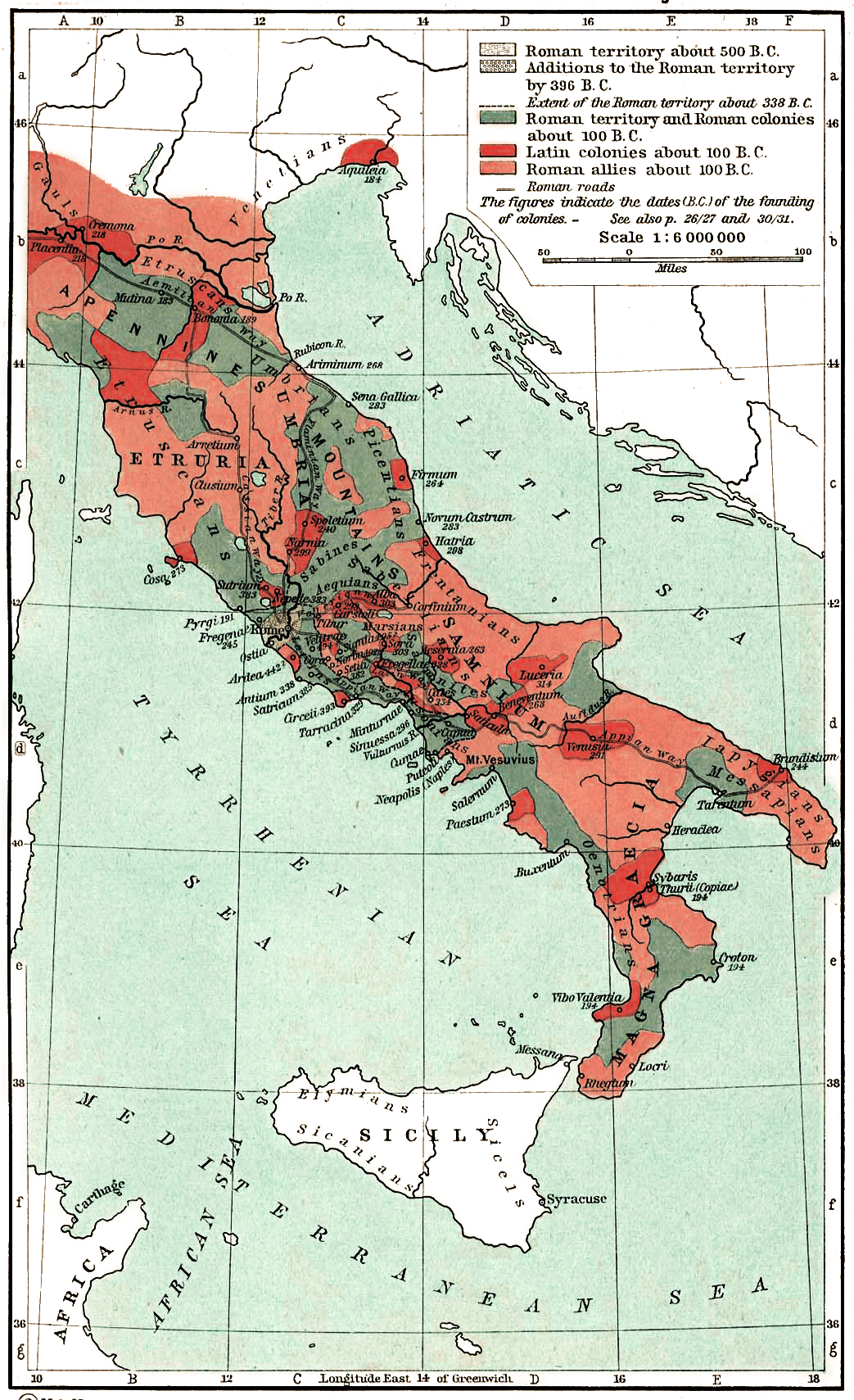
Victorious thus far, Drusus then began an agitation to prepare the people for the second part of his programme, the great law which was, in his idea, to regenerate the Roman people, by introducing into the citizen-body the great mass of Italian allies. Aware of the difficulties of the task, he got into communication with the chief men in each state throughout the peninsula. They visited his house, and formed an association for the purpose of pushing their claims. It is said that in every country town there was a branch started, whose members swore to live and die with Drusus, to spend life and fortune in behalf of him and of all other brethren who had taken the oath, and to enlist in the bond every possible helper. To institute such a society was to go perilously near the edge of conspiracy and high treason, and its framer can hardly have supposed that he had made the oath harmless and constitutional by adding a clause in which the members bound themselves, “when they had received the franchise, to regard Rome as their fatherland and Drusus as their patron.” The association was soon well rooted in every corner of the land, and provided the Italians with the bond of organisation and the common executive whose want had hitherto been their weakness.
Drusus had not been wrong in thinking that the proposal to enfranchise the allies would shake the allegiance of many of his followers, and gain him bitter enemies. Both in the Senate and in the urban multitude there were many who began to fall away from him when he insisted on the necessity of this great measure. After a time he lost the control of the Senate, and a majority in it voted that his first set of laws had been invalid, owing to the informal way in which they had been passed en bloc under a single preamble.
But the resolution of the haughty tribune was not in the least shaken. He announced his intention of persisting with his schemes in spite of all opposition: he made no attempt to dispute the legality of the Senate’s decision as to his laws, but determined to bring forward the question of the Italians. How far he would have carried the matter we cannot tell, for one evening as he was returning to his own house, after making a harangue in the Forum, he was murdered. A multitude was pressing around him, when he was seen to stumble and fall: he had been stabbed in the groin with a cobbler’s knife, which was found sticking in the wound. Within a few hours he was dead, and all his plans perished with him. His enemies of the Equestrian Order succeeded in getting a bill passed by the Comitia to the effect that the association which he had formed had been treasonable, and that both his friends in the Senate and his chief agents among the allies should be prosecuted for conspiracy.
The news that Drusus had been murdered, and that a Special Commission had been appointed to try his supporters, was the signal for the outbreak of rebellion all over Italy. The chief men of all the allied cities had learnt to know each other in the reformer’s house, and had ascertained that they all had the same grievances and the same desires. The desperate meaning to the Italians of the present crisis was that they had now ascertained that neither party in the Roman state would ever help them. They had long supposed that they might count on the aid of the Democrats, for both the Gracchi and Saturninus had promised them relief. The Optimates, as they had supposed, were their enemies: but now the best of the Optimates had taken up their cause: Drusus had been supported by men such as Crassus the orator, Aurelius Cotta, and the aged M. Aemilius Scaurus, the princeps senatus. It was the main body of the Democratic party, and its allies, the Equites, who had foiled the plans of Drusus. The urban multitude in its narrow jealousy had deserted him, lest it might lose some portion of its shows and its corn-doles. The tribune Varius, who had proposed the bill against the friends of Drusus, was a well-known Democrat, and his chief supporters were Equites.
Realising that the Democracy was really as hostile to them as the most bigoted conservative in the Optimate party, the Italians saw that they could only hope to gain their rights by unsheathing the sword. Within three months of the death of Drusus, the whole peninsula from Picenum southward was in arms: few states save the Latin colonies continued faithful to the Roman cause.
With the details of the fierce but confused campaign which raged all over Italy during the years B.C. 90-89 it is not necessary to deal. The odds were against Rome: the sturdy yeomen of the Apennine valleys were individually better men than the town-bred legions whom the consuls, Lucius Caesar and Rutilius Lupus, led against them. It must be confessed, however, that the Romans fought far better than might have been expected: even the urban multitude displayed a savage determination worthy of their ancestors, and offered to give up even their cherished corn-dole in the day of necessity. But the citizens were opposed by superior numbers; their officers were for the most part incapable; the campaign presented a thousand difficulties because of the necessity of endeavouring to relieve the many outlying garrisons — Latin colonies for the most part — in remote corners of Italy.
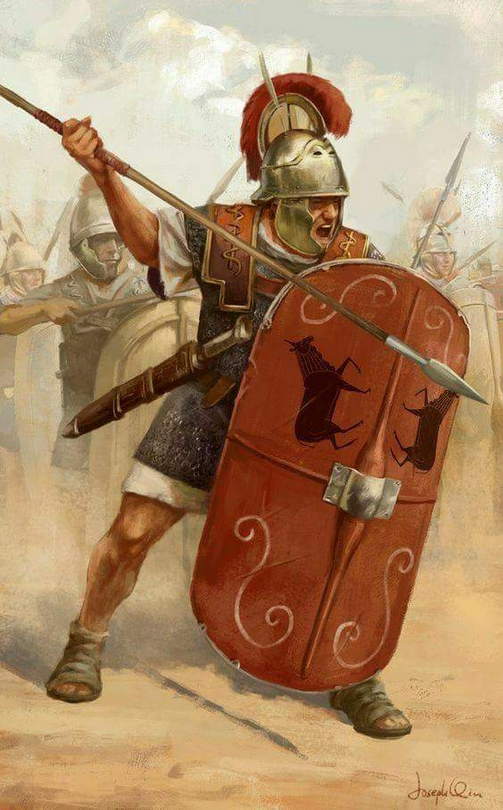
If Rome was not crushed in the first year of the war, it was because she still retained many advantages. She had the undisputed command of the sea, and by means of it could send succours round the peninsula, even when the central lines of communication were held by the enemy. The provinces, fortunately for her, did not choose this moment to revolt; from them she drew not only numerous auxiliary troops, but also the ample supply of money and food by which alone the war could be maintained: the revolted Italians were terribly handicapped by their poverty. Rome had also a considerable number of officers — headed by Marius himself — who were accustomed to commanding and moving large bodies of men: none of the Italian generals had ever headed any force larger than a cohort, and they had to learn the art of handling armies numbered by tens of thousands without any previous experience. But the most important factor of all in the struggle was that Rome represented unity of action and organisation, as opposed to a heterogeneous mass of tribes of very different races, divided by local interests and old grudges. The Italians did not succeed in setting up a vigorous federal government: the constitution which they devised for themselves was a slavish and stupid imitation of that of Rome, which failed to give them either a vigorous executive or a capable administrative council.
Yet, in spite of all these advantages, the experiences of the first year of war so tried the strength of Rome and broke down her haughty spirit, that she practically consented to grant the allies the franchise which they had demanded. The Lex Julia, passed in the winter of B.C. 90, gave the citizenship to all the Italian communities who had remained faithful, including the whole of the populous Latin colonies. Having once surrendered the principle for which they had entered on the war, the Romans did not hesitate to go farther. Only two or three months after the Lex Julia had been enacted, there followed the still more important Lex Plautia Papiria, which granted the franchise to every individual Italian who should lay down his arms and appear before a magistrate to crave enrollment as a Roman citizen. This law saved the existence of Rome, at the sacrifice of her old claim to dominate Italy as a mistress. The rebels flocked in by tens of thousands to give in their names and to take up the long-coveted status of citizen. The power of the insurrection was so much thinned that the second campaign of the war, that of B.C. 89, went almost entirely in favour of the Romans. District after district was subdued, and at the end of the year only the obstinate Samnites and the less important tribes of Lucania remained in arms. It was clear that the fate of the war had been decided, and that the crushing of the last desperate rebels could only be a matter of time. The Romans once more breathed freely, and, contented to have saved the existence of the city and the empire, contemplated with comparative equanimity the crowd of new citizens with whom for the future they had to share the dominion of the world.
At this moment, the most inappropriate one that could have been chosen — for Samnium had still to be subdued, and a great foreign war with King Mithradates was just breaking out — civil strife recommenced at Rome. The conduct of the two parties was absolutely insane: there is no parallel for it in history save one: the state of France in 1793-94, when foreign invasion, domestic insurrection, and bloody proscriptions in the capital were all in progress at once, bears much similarity to the state of Italy in B.C. 88-87.
That civil war should arise, when every man and every sesterce was still wanted to preserve the state from dangerous external troubles, is all the more astonishing because in B.C. 88 both the Optimate and the Democratic parties were in a deep state of discredit. No one could say that the rule of the Senate during the last thirty years had been anything but feeble and incompetent. On the other hand, all the main items of the Democratic programme had been tried and found wanting. The agrarian and colonial schemes of the Gracchi had failed to regenerate the state — farming was as unprofitable as ever. The corn-dole of Caius Gracchus had been in working order for a whole generation, and had been carried to its logical extreme by Saturninus and Drusus; yet the urban population was as miserable and as discontented as ever. The franchise had now been granted to the Italians, who had obtained possession of every personal immunity and political privilege that they could wish — save indeed that they had been enrolled in eight tribes only, so that their voting power in the Comitia was not fully equivalent to their numbers. But it had always been the practical advantages of citizenship rather than the right to register their suffrages that they had desired.
But a party does not necessarily cease to exist because its programme is played out, more especially a party of criticism and discontent, such as that of the Roman populares. They were, if anything, more violent than they had ever been before, though all the constructive items in their political creed had been tried and had proved futile, so that nothing really remained of it save the single destructive cry of “Down with the Senate.” But if no longer a party with measures, they were now a party with men. The great civil war that was approaching was to show that the personal ambitions of a Marius, a Sulpicius, or a Cinna supplied enough of a war-cry to unite the turbulent elements in Rome, and that the populares could continue to exist even without a popular programme.
Hitherto all the really important constitutional and economic quarrels between Optimates and Democrats had been fought out by mere rioting and chance medley; but now a fierce and prolonged civil war, which was to put scores of legions in the field, was to follow on a mere personal rivalry for a military command. A tribune named Sulpicius Rufus, to whom the mantle of Saturninus had descended, was busy in formulating some new reforms of second-rate importance. The most prominent of them was a bill for distributing the freedmen (who had hitherto been confined to the four city tribes) and the new Italian citizens (who had in a similar way been told off to eight tribes only) among the whole of the old constituencies. There was no great point in the bill so far as the Italians were concerned, for they would rarely if ever come up to vote, on account of the mere difficulties of distance. As to the freedmen, they were the worst element in the state, and to propose to give them more power in the Comitia than they already enjoyed was the act of the most unscrupulous demagogy.
Sulpicius, as it would seem, was a man from whom such legislation might be expected. We have no unbiased account of his character and his plans, but the records which his enemies have left behind paint him in the most lurid colours. “He was inferior to none in desperate attempts,” writes Plutarch, inspired by some Optimate authority. “He was a compound of cruelty, insolence, and avarice, and could commit the most infamous crimes in cold blood. He openly sold the citizenship of Rome to persons who had been slaves, and received their money told out on a table in the Forum. He always went about with a band of 300 armed satellites, and had a council of young Equites whom he called his anti-senate. Though he got a law passed that every man who owed more than 2000 denarii should be expelled from the Senate, he had debts himself to the amount of three millions.” There seems no doubt that he could vie in ruffianly violence with Saturninus and Glaucia. Several times he cleared his adversaries out of the Comitia with staves and daggers. On one occasion, it is said, he tried to murder the consuls Pompeius and Sulla during the actual session of the assembly. The son of the former was killed in this desperate riot.
However exaggerated may be the language of Plutarch, it is at least clear that Sulpicius was a man of violent and unscrupulous character: but for the moment he had control of the streets and the assembly, and it was to him that those who had something to gain addressed themselves. Accordingly it does not surprise us to find him adding to the many laws which he passed one intended for the private and personal benefit of one of his friends. It was a decree appointing Caius Marius to the command of the army which was to be sent to the East to repel King Mithradates. The old general had recovered from the shock of his political humiliation in B.C. 99. He had been entrusted with a considerable body of legions during the Italian war, and had fought with success against the rebels, though he had not gained any very striking victories. He felt that he was only half rehabilitated in the eyes of his fellow-citizens, and was anxious to close his career with a series of brilliant campaigns which should cause them to forget the names of Saturninus and Glaucia. The King of Pontus was, he thought, the kind of enemy who would provide a Roman general with the opportunity for winning a sensational triumph, annexing whole provinces, and accumulating untold stores of plunder and trophies. If he returned to Rome laden with the spoils of the East, he would once more occupy the commanding position in the state which he had enjoyed at the end of the Cimbric war.
The army which was destined for the Asiatic campaign was at present lying under the walls of Nola, the last fortress in the lowlands which was still in the hands of the rebellious Samnites. But it was believed that the place would soon fall, and then the six legions which formed the besieging force would be disposable for service over-seas. They were at present under the command of the consul L. Cornelius Sulla, to whom the charge of the Mithradatic war had been duly assigned by the Senate. He was a prominent member of the Optimate party and an old enemy of Marius. In displacing him, the aged general would not merely secure the command of the best Roman army then existing, but would also disappoint and humiliate a personal foe.
Accordingly Marius allied himself to Sulpicius Rufus and paid his enormous debts, while in return the tribune passed the decree which deprived Sulla of his army. They little knew the manner of man they were provoking. Their bill was to cost one of them his life, and to cause the other to be hunted out of Italy and driven into a miserable exile. They had stirred up into action the most capable and the most relentless enemy that the Democracy was ever to know.
(Go back to previous chapter)
(Continue to next chapter)








